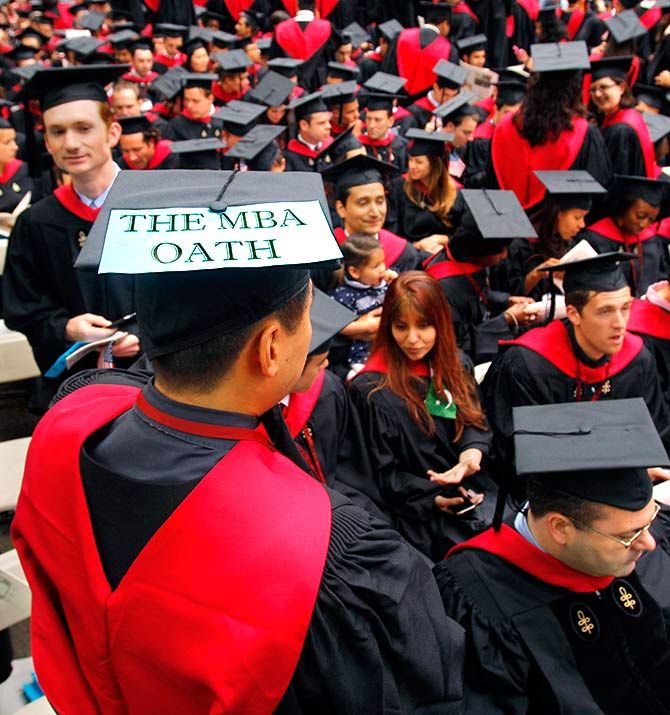'I have realised that if we want to make a difference in global ranking, there has to be movement in a few dimensions, but it is a bit beyond us.'
Outgoing IIM-A director Ashish Nanda discusses his tenure at the revered institute with Vinay Umarji.

Just when the Indian Institutes of Management (IIMs) were close to granting degrees through the IIM Bill, which awaits Parliament's nod, Ashish Nanda, director of IIM-Ahmedabad (IIM-A), has stepped down, effective September 1, a year before his term ended.
The premier B-school is in the middle of several initiatives that look to improve its quality on various fronts, such as faculty, research, placements, and infrastructure. However, the institute's first international faculty director and former Harvard professor maintains it is the right time to step down.
Nanda talks about the trajectory that the institute has taken and what lies ahead.
Excerpts:
Your decision to step down comes at a time when the IIM Bill is likely to be passed this year.
It is for Parliament to decide now. If it comes through, it is a good Bill. It will give us an opportunity to strengthen the institution.
How would you review your three-and-a-half years at the helm of IIM-A?
We have made significant progress in the three areas that we began working on, namely, connect, nurture, and grow.
In connect, we wanted to reach out to five constituencies including faculty, practice, policy, alumni, and community. Of these, we are being more proactive in recruiting teachers and enhancing research. We are connecting with practice through more case writing and progress in executive education.
We have to increase case writing, though the quality has improved.
For policy, we are setting up a school of public policy, which will be ready in two-three years and have a PGP-PMP (post-graduate programme-public management and policy) kind of course. We are also reaching out to the alumni. Every year, we go to 10-12 local chapters and 10 reunions as against two earlier.
In the local community, we are linking other schools and institutions in the region.
We are nurturing high performance in the institution by giving people autonomy, creating an atmosphere of excellence, and identifying faculty growth.
We also wanted to grow in areas of potential. For example, we have gone to two sections in PGPX, just started ePGP, seen significant growth in executive education, and using distant learning technology effectively.
We are planning to grow our other programmes when we have more physical assets available. For this, we have gone ahead with a significant campus expansion and renewal plans to build more capacity.
Continuing to build capacity in the existing campus, we are setting up engagement centres that are not new campuses.
How has the institute grown in teaching quality, research, and global ranking?
In teaching, we have been doing well. But in the last three years we reviewed and refreshed all the programmes.
In research, we have made some investments, and the result is showing in terms of the number of peer-reviewed papers.
I have realised that if we want to make a difference in global ranking, there has to be movement in a few dimensions, but it is a bit beyond us.
The first dimension is international diversity of participants.
The second is exchange rates, which are affecting us negatively.
Third, IIM students come with high expectations.
Rankings are a good metric but they are not a good target. If we are doing everything right, rankings will improve. However, we will continue to strengthen in rankings.
You said you were stepping down at the right time. What do you mean by that?
There are two main reasons for this.
One, it was getting a bit difficult on the personal front though professionally things were going great.
Second, the institute is in a very good place. I see that my colleagues are motivated and the institute has found a certain sense of alignment of where it needs to go.
Our chairman of the board (Kumar Mangalam Birla) is very energetic and committed to the institute. The board has done a fantastic job in guiding and counselling. The alumni abroad are committed to the institution.
The staff is loyal and the students are brilliant.
We are in a situation in which the government has recognised the importance of our autonomy.
We have a sense where we want to go and what we want to do. Such a time is a good time for a transition.
What should the next director expect?
I am confident the people here will continue on the direction that the institute has taken.
We have embarked on capacity expansion and an infrastructure renewal programme, which has a horizon of three years or so. There are five new projects we are working on including conserving and restoring the iconic campus building, which will go on for another three-five years.
So, it will be an item of significant importance to the next director.
While we have done a good job in providing faculty with research support and opportunities in executive education and career growth within IIM-A, the one dimension we need to be more focused and clear about is faculty recruitment.
The other element is that as our physical capacity grows, we have to grow our programme in a thoughtful manner. We will have to make sure that the existing programmes continue in a manner that the quality remains high.
I am sure my successor will have his or her own plan of what to do, but we are making good progress in the trajectory that we are on.
What are your plans after IIM-A? Will you join back Harvard?
I have to go back to Boston. We will worry about that (joining) later.











